 |
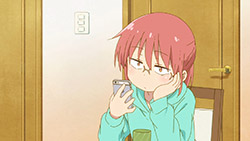 |
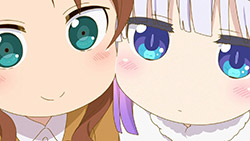 |
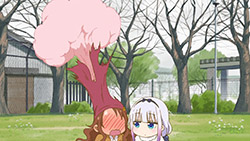 |
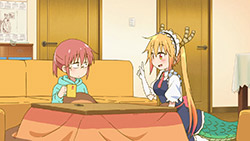 |
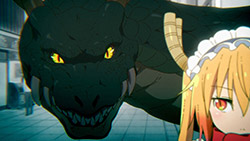 |
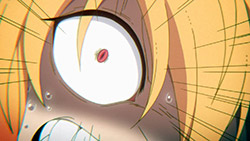 |
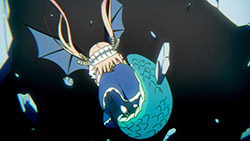 |
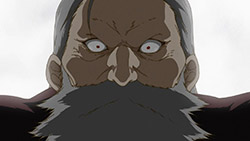 |
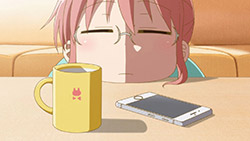 |
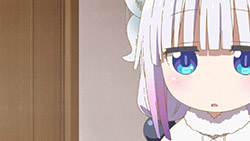 |
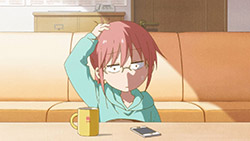 |
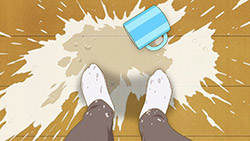 |
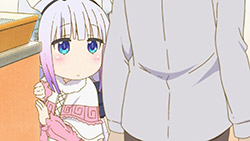 |
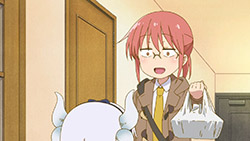 |
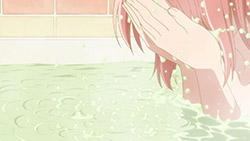 |
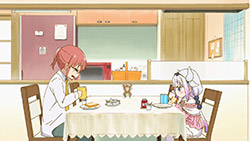 |
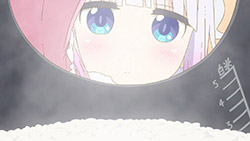 |
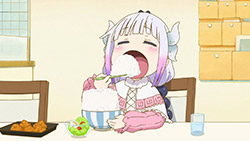 |
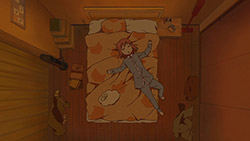 |
 |
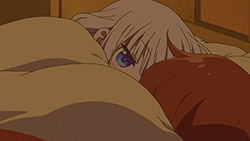 |
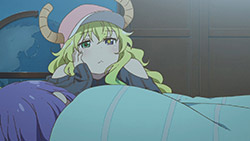 |
 |
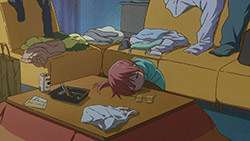 |
 |
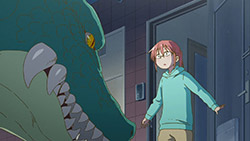 |
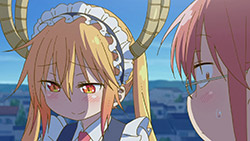 |
 |
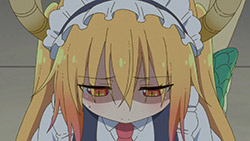 |
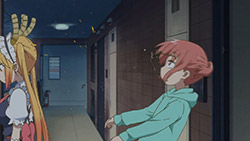 |
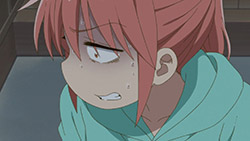 |
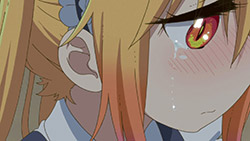 |
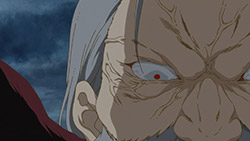 |
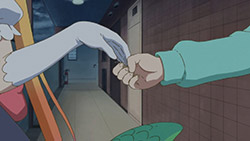 |
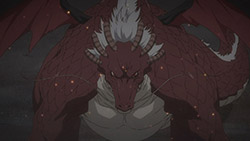 |
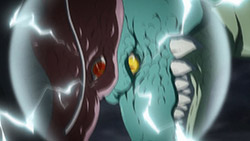 |
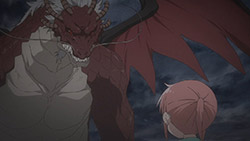 |
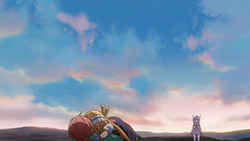 |
「終焉帝、来る! (気がつけば最終回です)」 (Shuuentei, Kuru! (Kigatsukeba Saishuukaidesu))
“Emperor of Demise Arrives! (It Was the Final Episode Before We Knew It)”
I’m pretty sure that’s not what happened in the source material — but I still loved every moment of it.
Life without Tooru
Boy, if there is a studio that understands how to create a sense of dread and sadness, Kyoani would be that studio. Thinking back to all the different series they’ve adapted that had scenes that literally took my heart and ripped it into two only to then light it on fire and then rip it in half again, I should have knew better than to expose myself to this type of Kyoani tomfoolery. That said, I think the short period between when Tooru was swept away by her father and when she showed up at Kobayashi’s door was probably my favorite part of the whole episode. The sense of something being just not quite right combined with Kobayashi not really expressing any of her feelings created the perfect atmosphere for the reunion scene that literally ripped the tears out of my face. Sure, watching the house fall into disarray probably helped, but even without the small touches I’m sure the whole thing would have extracted the same emotions out of me.
Anyways, lets jump into those final impressions since there is a good amount of stuff I’d like to talk about. Catch you after the break!
Epilogue:
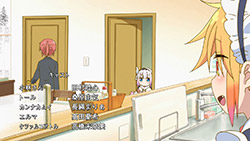 |
 |
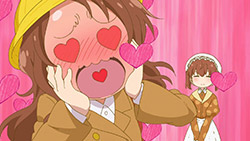 |
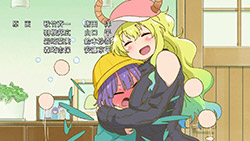 |
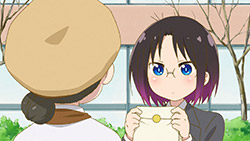 |
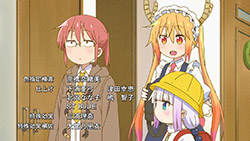 |
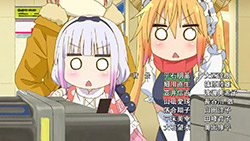 |
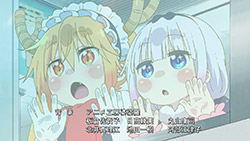 |
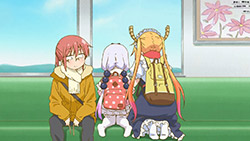 |
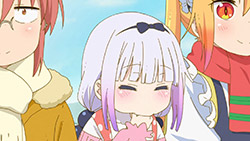 |
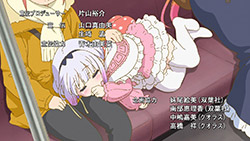 |
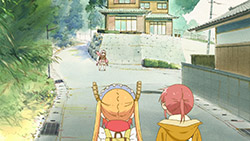 |
Final Impressions
Boy, where do I even start with this show. After a rather lackluster first episode (yes, I remember that the first episode wasn’t particularly bad or good), every episode after has been a lesson in just how bad it is to judge a book by its cover. With a simple story that piled on the small details and a well rounded (haha get it) cast of characters that at this point could have their own successful spinoff show, you’d be hard pressed to find someone who didn’t enjoy Maid Dragon for one reason or another. Toss in its recent explosion in popularity about half way through with gifs of Kanna taking the internet by storm and I think it’s safe to say that this show has a rather dedicated following of hardcore and casual anime watchers.
For me personally though, I really enjoyed the way that Maid Dragon tried to tell us a story about different groups of people who over time learned just what it means to be family. With Kobayashi, Tooru, and Kanna being the prime example, I loved the way the story painted them as a somewhat dysfunctional family that grew and matured together as they realized just how much they cared about one another. With each having their own issues — Kobayashi and her personality flaws, Tooru struggling to handle a new life and a new perspective on others, and even Kanna as someone who was looking for a parental figure to provide her the parental attention she always wanted — it was an absolute joy to see them all grow into totally different characters throughout the season. In addition to that, I think what really grew on me was Kobayashi or rather how much I connect with her. In a somewhat similar situation right now, I sometimes can’t help but project myself onto Kobayashi and wonder what I’d do in her shoes during some episodes. If anything it feels like I’m getting the opportunity to see just how great life can be depending on how you go about it.
Life troubles aside, the other characters in this show also had a strong presence that Kyoani graciously delivered without missing a beat. Fafnir and Takiya, Lucoa and Shouta, and Saikawa (with Kanna I suppose) all became memorable characters that you’d be downright sad if you didn’t see. Sure, they may have been shoehorned into a somewhat specific role, but even then we got to see different sides of each characters throughout the season. Something that isn’t all too common in slice-of-lifes but I’m glad whenever it happens.
That said, great characters alone don’t make for a good show. And while I wouldn’t say Maid Dragon had a “strong” story by any means, I’m glad that there was a clear sense of progression as each episode passed. Instead of just meeting characters and watching them go about their everyday lives, we got a clear sense of time moving forward with each passing episode. However, I would be lying if I didn’t say that certain parts of the storytelling left me feeling rather unsatisfied at times. This might be simply because I had already read the source material to research this show for the Season Preview, but there were definitely times that story fell flat on its face — typically when different moments from different chapters or anime-only content were spliced together.
Overall though, I thoroughly enjoyed Maid Dragon and would highly recommend it without a second thought. It has a great cast of characters that almost anyone can identify with, the story is at worst good but at its best is amazing, and the dynamics between the main cast of characters could melt even the coldest of hearts. All-in-all, even with a large array of titles that someone could watch, I’d probably force anyone I cared about to watch this show.
P.S. Thank you to everyone who’s been keeping up with these posts! It’s been a fun ride and I’ll see you around this new season as the crew previews a ton of new shows. See you!

This episode is based on Chapter 20 of the manga called “Tohru and Father”. I think the conflict here is way better executed in the anime than the manga. In fact, I think it’s one of the anime’s best episodes.
If I recall correctly (this may be spoilers for the manga chapter, but honestly, most, if not all, of what was in that chapter is in this episode) Show Spoiler ▼
https://randomc.net/image/Kobayashi-san%20Chi%20no%20Maid%20Dragon/Kobayashi-san%20Chi%20no%20Maid%20Dragon%20-%2013%20-%20Large%2048.jpg
I have to say, I was not expecting such a family-focused direction getting into this earlier on. I looked into the manga after a few episodes, and though it did have those touching moments, it was more heavy on the gags and fanservice. I think I enjoyed the anime’s approach more, as effective in the way it explored relevant themes of family and belonging without it being forced or out of place, with the occasional joke weaved in.
https://randomc.net/image/Kobayashi-san%20Chi%20no%20Maid%20Dragon/Kobayashi-san%20Chi%20no%20Maid%20Dragon%20-%2013%20-%20Large%2044.jpg
I would have appreciated more of the other dragon antics (and maybe even the apartment neighbors as well), however. I feel like Elma was introduced a bit late, and subsequent episodes reduced her to few-second gags with little to no lines. I don’t mind the other dragons just assimilating with human life with not as much conflict (but we did have that nice moment with Fafnir), as we had enough of the family ramblings and human-dragon conflict in the Kobayashi household.
I do feel like this series had lower production values than other Kyoto Animation series. The sports festival episode especially felt rather static animation-wise. This episode felt like a solid conclusion to the anime series overall, and there may not be a second season (at least any time soon as the manga needs more material for them to work with). There is the forthcoming Valentine’s OVA coming later in the year along with the DVD shorts.
All in all, it was a rather enjoyable series and I honestly wouldn’t mind watching it all over again.
Side note: I think we all need Kanna in our lives…
https://randomc.net/image/Kobayashi-san%20Chi%20no%20Maid%20Dragon/Kobayashi-san%20Chi%20no%20Maid%20Dragon%20-%2013%20-%20Large%2001.jpg
Thank you, Takaii, for blogging this series!
Thanks for the awesome comment and thanks for the thanks!
This is one of the shows that I am most eager to watch this past season… and I dreaded this last episode since I started to fall in love with this show. I will have to rewatch it soon to fill the void it has left. Thank you for covering this anime.
Thanks for sticking around for the posts 🙂
Splitting up comments between Episode 13 & final thoughts. On to Episode 13… I suspect I’m taking the proverbial road less traveled here. I am a manga reader and this did go off source, and yeah, I like the manga version better.
Same comment as a few other episodes. Wasn’t bad, but wasn’t that good and could (IMO should) have been better. Frankly, I had pretty high expectations for this episode given source material (ch 19 & 20), and was kind of disappointed. Since they only covered two chapters (manga chapters are short), anime original material didn’t surprise me, but I did hope for better.
First off, I didn’t like the “I’m the doubt within you” dragon. It’s not like Tooru has a split personality. “Because I’m Kobayashi-san’s maid” “You’re not. You’re a dragon”. Pardon my language, but no shit. When has Tooru EVER, and I mean EVER, not thought of herself as a dragon. That’s her “shtick” – you know, all the “I won’t lose to inferior humans” and such. Yeah, she’s a maid, but a DRAGON maid. Manga doesn’t do this for a reason.
It’s inconsistent and unnecessary. Manga presentation is simpler, and IMO more effective. Also will add that the anime should have gone with the manga’s totally black screen with “What if… Kobayashi-san dies” (in white text) then a close up of Tooru gnashing her dragon teeth at the thought of that. The 100% black screen is symbolic. The complete emptiness for Tooru when Kobayashi dies. Very clear how Kobayashi has become everything to Tooru by now. The manga’s facial close up was much more powerful visually for me in terms of expressing fright/anguish/frustration than what the anime gave us.
Back to anime. Now Tooru’s dad shows up and, welp, that is that. No fight, no nothing as Tooru is “gone for good”. This is all anime only until Tooru returns. Again, I get they had to pad runtime, but unlike Takaii, I did not find what follows to be the best stuff. Here’s the problem – You’re not fooling ANYONE KyoAni. Seriously, did anyone (manga reader or not) think “Welp, that’s it. Tooru’s gone back home for good. The End”. No (and it would be a totally shitty anime original ending.) So ultimately, this is pointless filler. Personally, I just patiently waited (tempted to fast-forward) to when Tooru showed up again, and *gasp* she did.
After that, a mixed of manga and anime-original stuff. Not bothering to go through all the differences, but I didn’t think this episode’s tone meshed very well with the tone of the entire series up until this point. Manga’s more consistent with tone. One last thing, and I feel this is important. Anime version undermines Tooru’s character. It’s NOT all Kobayashi in the manga.
Kobayashi does stand up to Tooru’s dad and in doing so hardens Tooru’s resolve, BUT when Tooru’s dad goes to hit Kobayashi, Tooru stops him (grabs his wrist – they don’t morph into dragon form ever), then glares at him with such ferocity that he admits Tooru actually intimidated him. This is important stuff. First, anime doesn’t put Tooru & Kobayashi on equal footing. It’s all Kobayashi. Second, part of the story is Tooru “growing up” – becoming independent, finding her own values (i.e. discussion during beach episode), etc. Anime version screws that up. Bleh.
Like all season, fair or not, I tend to compare this anime adaptation’s execution to Demi-chan, and here again, I think Demi-chan did it better. What the anime could have done is what Demi-chan did, but in one episode rather than two. So have your big emotional moment the first 2/3 and stick closely to source (e.g. Demi-chan Ep. 11). Then we can have a light “palate cleansing” last 1/3 (e.g. Demi-chan Ep. 12). The last 1/3 could be per manga (unused chapter) or I guess anime original.
The doubt dragon sequence did feel a bit disjointed from the rest of the series, and maybe they shouldn’t have been so blatant as to have it in the dialogue with Tohru confirming that the dragon is the doubt within her. But I don’t think this sequence was about Tohru doubting herself as a dragon, but doubting her place in Kobayashi’s world.
And I think the “padding of the run time” worked better than just having Tohru’s father getting all “intimidated” by Tohru and quickly retreating after a few words. It felt anti-climatic in the manga, especially with the short 20-or-so-page duration of that storyline.
This episode may seem like a sudden shift in tone, but I felt like the preceding episodes built up to the drama well enough for it not feeling to forced. KyoAni shows have done this in the past, with Phantom World being the worst at this. I don’t really mind the way they did it this time, though.
It didn’t help that the new season of Samurai Jack is airing concurrently here in the States at the same time this finale episode aired in Japan, and the Jack episode ALSO included an imaginary self side talking to Jack to represent his own doubts. But they NEVER explained to the audience who that was- we got it immediately on our own! Here though, Tohru’s doubtful side just says “i’m your doubtful side” as her first line! Spoon-feeding!!
I would also like to add a few more things about doubt dragon. You can say that Tohru does not have a split personality, but what Takemoto is probably trying to do is something similar to The Disappearance of Haruhi Suzumiya with the ‘Kyon’s choice’ sequence.
Tohru has been living in her human form for the majority of her time in Kobayashi’s world. Her mannerisms and behaviour may have remnants of her dragon roots, but throughout the series, she has tried hard to please Kobayashi by being a maid and assimilating with human society. That may be paradoxical to her disdain for humans, but in the end, she does it for Kobayashi. And in all likelihood, her time in her human form made her get used to human society. Not many humans know that she is actually a dragon aside from the people around Kobayashi.
The dragon form in that sequence obviousky represents Tohru’s dragon subconscious whilst she is contemplating in her human facade. And her human form is just that: a facade. And she’s used that form for long durations to avoid her origins enough to doubt herself, and doubt her place in a world with Kobayashi upon this realisaton, especially when their age progression are distantly apart.
A big theme explored from the beginning of the anime is about not having any regrets. Tohru did say to Fafnir once in a previous episode that she understands that she will outlive Kobayashi, but wants to cherish her time with her, so maybe this occurrence of this doubt is out of place. A large part of this is about Tohru, and the resolution being brought about by her rather than Tohru may be because of the inherent nature of Tohru’s relationship with her father. I don’t think this resolution was a detriment to Tohru’s development because, after all, she does fight for Kobayashi. And that was most likely because of her dragon subconscience reemerging through her human facade.
Hmmm I think kyoani makes a good job with the new scene with tohru father…sure I feel the in the manga was more cool but that conclusion was not fit with the theme so far…
I think the theme so far is about live with a family the good and the bad…rather than intimidating or fighting her father I think what Kobayashi said “can’t you try to believe your own daughter?” Was more hurting to any proper father.
This season we have two amazing adult character, Kobayashi and Takahashi
@jcoe: I’ll address both your posts. Sorry if this is long, but I wanted to sufficiently address all your comments. Agree that the doubt dragon was disjointed from the rest of the series. While watching, initially it was a literal WTF moment for me. Obviously, as you say, it’s symbolic, but none of the internal discussion was anything new. The whole thing is jarring since this has never happened before when she previously went over the exact same issues. As you note, this has been a running theme which makes lines like “face me” (as in face your doubts) ridiculous. She certainly faced Fafnir when he posed such questions previously. Even more ridiculous is Tooru asking the doubt dragon “Are you me”? SMH
Thus IMO it’s jarring and certainly adds nothing to the manga’s version which did not feature that. Yes, Tooru has adapted to the human world to live with Kobayashi, but she’s NEVER considered herself anything BUT a dragon, so any symbolism of dichotomy is misplaced IMO. I checked the manga, and doing so just make my opinion about the doubt dragon scene worse because despite having MORE than enough runtime, the anime freaking cut manga material to make room for all the anime original stuff. Bad KyoAni.
— ”Tohru did say to Fafnir once in a previous episode that she understands that she will outlive Kobayashi, but wants to cherish her time with her, so maybe this occurrence of this doubt is out of place.”
Yep and there’s where the erroneous material cuts take effect. What’s cut: “I know everything, but I can’t stay calm without repeating myself like this. … Is there a place for me? Even when I have these thoughts, when I see Kobayashi-san;s face, they all escape my head. Yes… living with Kobayashi-san… living with Kanna… this is where I belong.” FYI – the latter parts of the internal dialog take place as Tooru returns from shopping, right before her dad shows up at their front door. It’s perfectly explained. This is a moment of affirmation, which make even MORE sense in the manga because it comes much earlier in the manga than in the anime. But the anime had to go chop it up and muck with it on top of shuffling chapters. JMO, but bad adaptation move. Doubt dragon symbolism adds nothing at best and is jarring while the cut/altered manga scenes are detrimental. Manga 1, Anime 0.
— From your first post: ”And I think the “padding of the run time” worked better than just having Tohru’s father getting all “intimidated” by Tohru and quickly retreating after a few words. It felt anti-climatic in the manga, especially with the short 20-or-so-page duration of that storyline. From your second post: ”I don’t think this resolution was a detriment to Tohru’s development because, after all, she does fight for Kobayashi. And that was most likely because of her dragon subconscience reemerging through her human facade.”
Disagree. First, “dragon subconscience” had nothing to do with Tooru finding the resolve to stand up to her dad (why that’s never in the manga). It’s due to Kobayashi, a weak human, standing up to Tooru’s scary father and expressing how much she likes & values Tooru. Second, again, there is no split personality here which is what “dragon subconscience” suggests (and another reason why the doubt dragon symbolism is bad).
As for “climactic”, the dragon vs. dragon battle last all of 45 seconds (from start of attacks to when Kobayashi says “Wait, wait, wait!”). Not even 1 minute with the “climactic” resolution of Kobayashi giving Tooru’s dad a lecture on parenting. Nice lecture – Kobayashi makes some valid points, but not worth it at ALL given the importance of what is lost.
It IS detrimental because in the anime, it is Kobayashi, NOT Tooru, who ends up resolving the matter. That undermines Tooru’s character. Again, ultimately it’s ALL Kobayashi here. Yeah, Tooru fights, but not only does Kobayashi give Tooru resolve to do so (which is good – per manga, that’s Kobayashi’s big moment), but Kobayashi wins Tooru’s fight, and this IS Tooru’s fight. Anime ruins the balance here.
Tooru ultimately being the one to settle things does matter – a LOT, and the intimidation of her dad is part of that. It is part of a long running theme of Tooru becoming an adult. This is noted towards the end of the the beach episode (i.e. Tooru having different views than her parents). Adults may get support from others, but they win their own battles. Also, Tooru’s dad is not going to be intimidated by a child, but he might be intimated (and does) by an adult.
THAT is what that entire scene is about and the anime throws it in the trash. Furthermore, IMO the manga ends abruptly because it’s that moment when he is intimidated, that Tooru’s dad realizes Tooru’s become an adult and so he gives in. Her life, her decisions and consequences. Again, ALL of this is lost due to anime changes.
Manga 3, Anime 0 (3 rather than 2 because last 3 paragraphs show an egregious mistake IMO & thus worth more than 1 point).
Ah, I see. I must have recalled incorrectly. That does make the placement of that scene a bit weird for Tohru’s characterisation.
As for the short absence of Tohru when she returns to her world with her father, despite however effective it was, I think it was important to show what it was like for Kobayashi not having Tohru around. The episode may have had to jump through hoops to get there (and at the same time caused some of the problems you have mentioned), but I think that it is important for Kobayashi character development, especially to see her confront Tohru’s father by the end.
I agree that the anime is not a perfect adaptation, but with the direction it was going for, it can’t be a perfect adaptation. Nor is the manga perfect. I wouldn’t say it is as binary as saying Manga scores here, Anime scores there. The manga and anime go for two different approaches. They both do what they do best. But I think the anime had to make some compromises and add in new content to make the series cohesive with its familial plot line.
@Jcoe: First, quick point of clarification. The “scores” were not meant to be literal binary scores, but illustrative. So you can think of the first one as “manga > anime” and the second “manga >> anime” if that helps.
— ”As for the short absence of Tohru…I think it was important to show what it was like for Kobayashi not having Tohru around. … I think that it is important for Kobayashi character development, especially to see her confront Tohru’s father by the end.”
For me Tooru’s importance to Kobayashi is readily inferred given all that previously happened, and thus isn’t worth the cost of excluding something else I consider important. As I posted in a reply below, was anything that we saw (apartment a mess, Kobayashi sad) a surprise? I absolutely agree that it’s important for Kobayashi to confront Tooru’s father – not just for her character, but also for the two’s relationship and its effect on Tooru at that moment.
Thing is that the manga has that moment – when Kobayashi confronts Tooru’s dad at the apartment (let’s call that “Round 1”). Anime not only kept “Round 1”, but then added “Round 2” after Kobayashi interrupted the battle. “Round 2” didn’t have the same exact dialog, but it is duplicative in terms of Kobayashi confronting Tooru’s dad, and most importantly for me, it comes at the expense of something I consider quite important to Tooru’s character development. IMO, manga version has both characters’ development while the anime just emphasizes Kobyashi’s at the expense of Tooru’s. That’s not right IMO.
I agree, neither the manga nor the anime are perfect. I have my issues with some of the manga as well. However, for this episode’s content (or lack thereof), I think the anime erroneously went off script. As I mentioned in my season review below, there were times when I thought anime original content was good, positive material. Unfortunately, the anime wasn’t consistent in that regard. No question the anime had to make some compromises, but personally I think improvements could have easily been made. Still, I did post that IMO the anime was “pretty good”/“good enough”. Perhaps not the highest praise, but I’ve certainly seen worse and posted harsher review comments.
As for approach, honestly I didn’t think the anime’s approach was all that different from the manga, but yeah, perhaps some difference.
Regarding Tohru’s disappearance, while I agree that it was probably to pad for time, at the same time, I don’t feel they were trying tool the viewers into actually thinking Tohru wasn’t coming back, but rather were showing just how integral Tohru became for Kobayashi and perhaps even showing how Kobayashi took Tohru for granted. We had some earlier mentions with stuff like others commenting on Kobayashi’s attitude, her smiling more, and so on, but we see now, with Tohru gone, the garbage starts to pile up again, you got Kobayashi and Kanna waking up late, you have them eating instant or take-out food, and so on coupled with obvious attitude drops.
@HalfDemonInuyasha: First, I didn’t literally mean that KyoAni is trying to fool the audience. I’ve seen that phrase used before in similar cases like when you KNOW a character isn’t dead despite how much the story tries to make it seem that way. In retrospect, I probably should have written something to the effect of “robbed of any real emotional impact” rather than “pointless filler” though for me while watching I did have both thoughts.
In terms of showing how integral Tooru has become in Kobayashi’s life, this is nothing new. We already know, or at the very least can easily infer, that from everything we’ve seen previously as you note. Was anyone surprised that Kobayashi’s place was messy or that she was feeling down with Tooru gone? As for taking Tooru for granted, IMO there might be something to that, but again, I think one could reasonably already infer that from prior episodes (i.e. how she sometimes fails to tell Tooru her cooking is good).
So for me at least, what was presented was stuff we already knew, but the main issue I wanted to highlight is that IMO any real emotional impact from that scene was lost because we all know Tooru’s coming back – in the very same episode in fact. One last thing, unlike the other two issues I’ve mentioned, I don’t consider this part detrimental, but a rather a “neutral” anime addition. Didn’t really add anything, but didn’t detracted either. Without any real emotional stakes or new insight, it was just kind of there. On it’s own that part could be fine, but that scene ties into a larger issue which I do think is detrimental.
Final Thoughts:
In an early episode (02? 03?) post, I wrote that IMO the adaptation was “good enough, but less than ideal.” After Ep. 13, I’m left with that conclusion. Again, wasn’t bad, probably ”pretty good”, but could, and IMO should, have been better.
It did perform its primary function which is to showcase the source material favorably. I didn’t read the manga until a couple months before this season started, and my “test drive” turned into “read all available”. Kobayashi-san is a fun comedy SOL (comedy being subjective) with likeable, outlandish characters and yet also some surprisingly sweet and endearing personal moments. It’s more than just comedy as Taikaii notes, and I think the anime adaptation conveyed that. I actually prefer this to Demi-chan as a series, because it has more (IMO) fun, comedy moments to go with the endearing character driven moments.
However, in terms of adaptation, IMO Demi-chan clearly got a better one. Demi-chan was consistently good (starting to think it’s a benchmark adaptation) whereas I found KyoAni’s adaptation inconsistent. Frustratingly so at times. It was never truly bad. Sometimes it was spot on, sometimes “close, but not quite” and sometimes sub-par/”just stick to the bloody source material”. Production values were consistently good though. Looked good IMO and had a quality feel.
In terms of characters, on the whole a solid job (including voice acting), but again some inconsistencies. A few times, Tooru was toned down a bit too much (e.g. market scene early episode), but overall fine. The show got Elma’s & Lucoa’s base characters right, but for both didn’t really know what to do with them other than “always hungry” or “boing!” boob jokes (with one exception toward the end which was good). For a show very willing to include anime original material, KyoAni could have done more with those two.
Then there’s Kanna. WOW!! If Demi-chan got Hikari 10/10, this show got Kanna 11/10. Just perfect, from character design and facial expressions to voice acting. In fact, almost too good because unlike when I read the manga, Kanna tended to overshadow the others in the anime at times. I was always drawn to her character while watching.
Execution also waivered. It did improve after a slow start. Points for that. Importantly it got some key emotional moments just right, particularly early/mid-season. Kanna going to school is a good example. Then again, I thought towards the end some emotional moments fell a bit flat, not up to the adaptation’s best levels. Same goes for comedy. Some jokes hit well, but for others the comedic execution was off. Then there’s the anime only material. Once again a mixed bag of some good, some OK and some (too much) sub-par.
Given the source material, some padding was necessary. However, IMO the adaptation would have been better served to use all available source material other than chapters involving a yet to be introduced character. There’s an onsen chapter out there which could have been used. Yes, another 1/3 episode of “fanservice”, but it won’t kill you anime. IIRC, there’s also another Elma chapter which could have been used (or used in full).
So yeah, good enough, but less than ideal. I did enjoy watching the show, and I would like a second season (be awhile for that though), so I can’t be too hard on KyoAni I suppose. Not only that, from comments, it seems the show surprised many anime-only viewers favorably. If that’s true, then have to call this adaptation a success. Less than ideal, but a success nonetheless.
@daikama
I totally agree with you. As avid manga readers, we inevitably draw comparisons. I did give KyoAni a bit more leeway since KyoAni had to fit fair amount of material into a 13-episode season, but I agree, certain parts of the series were disappointing (or wtf, just stick to the manga) while other parts were spot on adaptations (couldn’t ask for better). Of course, I’m really just crying over the fact that this series should have been 26 episodes to start with and had it been slated for that, I’m sure we would have gotten a much more thorough adaptation.
Despite the flaws in the Dragon Maid adaptation, I still thoroughly enjoyed the season, and if a second season comes out, I will for sure be watching. At the very least, KyoAni gets high marks (as usual) for the stellar animation and lovely character designs (still recovering from Kanna-induced diabetes). In closing, each episode never failed to put a smile on my face, so in my book, it’s a good Anime
@Aoihoshikage: Appreciate the reply. I would agree with you if it wasn’t for what KyoAni did with Ep. 13 – especially the end, changing it to “Kobayashi” saves the day instead of TOORU the one who gets her dad to back down per manga. Yeah, the manga’s presentation may not be as detailed/fleshed out as one might like for that chapter, but it’s important character development stuff that manga source gets right.
The in-your-face “doubt dragon” symbolism was bad/unnecessary, but I could deal with it even with meaningful cut dialog (though no reason for that to happen). The added “Tooru is gone” (but clearly not really) bit, I could also deal with. But screwing up character development, relationship balances, etc. NOPE. That is just BAD, unforgivable and absolutely unnecessary anime change. This is NOT an either/or situation. In the manga BOTH get their turn/character development/etc. Anime is ultimately all one sided, undermining a main character (and Tooru IS a main character). BAH! Shame KyoAni! Shame!
Does that negate all the positives from the entire season? No, but the more I think about it, the more it does impact my mental final score. I’m just amazed here. For 12 episodes, the anime essentially stuck to the source even if there were issues here and there, for some unfathomable reason decided to go significantly off source for the final episode. Even if they needed to stretch out 2 chapters (since usually 3 are covered) and didn’t want to do what I suggested above, hell I could write a script where you keep much Ep. 13, but include missing important dialog in place of stupid “doubt dragon” AND not f**k up Tooru’s key moment.
I’m still in for S2, but won’t lie. Thanks to Ep. 13, I’m more wary than I would be if this season stopped at Ep. 12. Source is not sacrosanct (it has issues), but that one change was just B A D.
Not a bad show by any means, but I just couldn’t get completely into it. I wanted to like it, and the season preview had me fairly optimistic that I would like this show more than I initially thought, but in the end it wasn’t meant to be. Decent to be sure, but I never could get close with the characters. Even during the final episode I tried to care, but was honestly happier with the fact that the anime was ending.
Oh well, not a show for me I suppose.
Yuri that dances on the edge of a razor.
If you’re comparing this episode to the manga, yeah, you’ll find issues.
If you look at this episode in light of the character development up to this
point, it fit and concluded the series very well.
Here’s my point. Kobayashi has grown throughout the series and the changes
to herself that have accumulated are so subtle that she hardly notices them.
Sometimes she remarks that she wouldn’t have done “that” before meeting Tooru,
but we (as least I didn’t) don’t get a sense of the strong emotional bond growing
between them. I don’t think romantic fits, but it was portrayed more of a living
arrangement rather than a solid commitment between two persons. She admits
that she wasn’t used to the idea of being wanted by someone.
This episode (IMHO) finally shows that relationship as a solid commitment as
Kobayashi:
stands her ground against Tooru’s father, and
takes the huge step of inviting her extended family to meet her mom.
I remember the telephone conservation with her mom where she lied about not
living alone; “just some friends were over.” So Kobayashi has come to
terms with where she is in all of this and has solidified her position
in the relationship.
Overall, I think a good job was done with this series. Some depth was
provided to the minor characters and made for an enjoyable watch.
I’d like to see another season…
I have to admit, as a longtime KyoAni fanboy holding the opinion that the studio has been stagnating for a few good years, Maid Dragon was not a welcome sight. After Euphonium, it seemed like KyoAni were going back into mediocrity. Thus I went in with incredibly low expectations, wondering why KyoAni made such a weird choice in terms of adapting a manga.
Well, I was utterly wrong. Maid Dragon was an amazing ride all the way to the end and it truly soared beyond my expectations! Not only was it a comedy aimed at providing for a wide range of fetishes, there were surprisingly meaningful and deep moments that gave the show a lot of substance.
I will surely miss Maid Dragon, and hope that KyoAni eventually provides a second season. It was my pleasure to follow Koboyashi’s Maid Dragon and all your posts along the way Takkun!
looking at previous comments, I guess I should feel good because I don’t read the manga. Because for me this episode contains all emotion to feel. Happy, shock, sad, scared, awe and then back to happy again, it’s a roller coaster.
Around ep.11 I started to see Kobayashi, Tooru and Kanna as one family and that amplifies the sudden goodbye and their happy reunion scene. I don’t remember why I started watching this, but it’s been a great ride watching the anime and reading your post Takaii! Thanks as always!
I wouldn’t say the manga is better than the anime. The manga is just different in execution. The anime goes for a more family-focused vibe and is more poignant in that regard, whereas the manga goes for straight up gags. They both have their own strengths and weaknesses.
Opinions will vary but IMO the manga is better than the anime. IMO saying the manga “goes for straight up gags” is misleading (though I did find manga comedy execution better in general). All the core poignant moments in the anime are based upon the manga (much of the comedy is as well). Some scenes are lengthened because the manga chapters are short and thus the anime had to add material to meet runtime, but the manga definitely has those character moments. That a big reason I got hooked on the manga. It’s has both comedy & character moments.
Sorry if the information I gave was misleading. I was saying that the anime emphasises more on the character moments. I didn’t have as many “laugh-out-loud” moments in the anime as I did in the manga. The manga does have these character moments, but I thought that the manga is stronger in the comedic sense than the anime was.
I’ll just say this…
Majiyabakune?
I will be sad to see this anime go, but I know it lives on in the past episodes we can rewatch, and the manga, and the merch! 🙂 Also, KyoAni will continue to create unbelievable animation. This show was only about LOVE, and it put a smile on my face in the middle of my week!
And I’m glad the story continues because once again, the 13-episode format really hindered the pacing with questionable time spent on one thing and not another, such as why Elma got very little screentime to ever make a strong impression, or why the fight here only lasted under a minute, and then had no resolution.
Overall I am pretty happy with how Kyoani adapted this, the anime original content largely complemented the source material instead of being filler or being out of character. If I had to make a complaint it would be that some of the jokes were overdone to the point that certain characters were borderline caricatures.
Season 2 when?